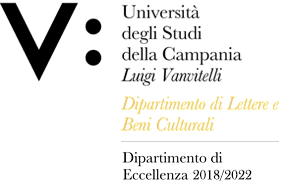Doctoral School of Human and Social Sciences
Areas of study: Conservation of Cultural Heritage – History, Philosophy, Literature
Ph.D. Coordinator: Prof.ssa Nadia Barrella
Administrative Office: Department of Humanities and Cultural Heritage
Email: Questo indirizzo email è protetto dagli spambots. È necessario abilitare JavaScript per vederlo.
Course description and objectives
The Ph.D. in History and Transmission of Cultural Heritage is a third-level course that provides young scholars with the opportunity to implement highly advanced interdisciplinary research methodologies in the Humanities, thus substantiating the doctoral areas of study combined with approaches such as cultural mediation and popularization. The program’s provision is based on a twofold objective. Firstly, it aims to educate scholars in conducting scientific research within their individual disciplinary areas of expertise. Secondly, the program aims to train highly qualified professionals in the field of cultural design and dissemination for the purpose of enhancing the knowledge of tangible and intangible cultural heritage. To accomplish this purpose, over the three-year period doctoral students will attend activities comprising advanced level courses, seminars, lectures, and lab-based research, thus providing them with cutting-edge methodological, historical and theoretical tools largely related to the Human Sciences. Popularizing humanistic knowledge is therefore one of the general outcomes of the program in which teaching activities will especially focus on dissemination practices, such as delivering scientific communication in multiple languages, using diverse tools and techniques, including computer-mediated techniques and strategies.
Employment opportunities
The doctoral program aims to prepare qualified scholars for different types of professional profiles. In line with this purpose, scholars will be eligible to pursue their research activity within academia or in other advanced research centers. Equally effective is the training of experts in the fields of broadcasting and digital media, cinema, theater, and publishing, particularly focusing on the conservation, protection, and digitalization of cultural heritage involving libraries, archives, museums, and cultural authorities. From a more educational perspective, doctoral students will acquire advanced skills to operate in the broad field of cultural dissemination and in the teaching sector. Regarding the valorization of tangible and intangible cultural resources and assets, the program also intends to prepare management experts qualified to direct archaeological excavations, and implement interventions in museums and collections.
Admissions modality
Evaluation of requisites and CV, written test, oral test, foreign language assessment
The AVA System and the SUA/RD | The National System
The AVA system (Self-Assessment, Periodic Evaluation, Accreditation) is designed to enhance the self-assessment of the quality and effectiveness of teaching and research activities at universities. It also introduces periodic evaluations of quality, efficiency, and the results achieved by institutions, as well as the system for initial and periodic accreditation of study programs and university campuses.
The core elements of the integrated AVA system are largely based not only on national legislation but also on the ENQA document Standards and Guidelines for Quality Assurance in the European Higher Education Area (ESG), approved by Ministers responsible for Higher Education at the Bergen Conference in 2005 and adopted in the Recommendation of the European Parliament and of the Council (2006/143/EC).
Italian universities began gradually implementing the integrated AVA system starting in 2013, following the issuance of Ministerial Decree 47/2013 (as amended by Decree 1059/2013), which incorporated the principles promoted by ANVUR.
The SUA-CdS and SUA-RD forms contain the necessary information for the system of self-assessment, periodic evaluation, and accreditation, as well as for defining the educational offering—from the creation to the activation phase of study programs—based on the principles of procedural simplification and efficiency.
The SUA-RD is an integral part of the AVA system and prepares universities for the evaluations they will undergo in the next five years, as provided for by current regulations.
Its completion, together with that of the SUA-CdS form, has the immediate and direct effect of making the AVA process simpler and more consistent, sparing institutions the effort of drafting separate preparatory documents for site visits. Additionally, the SUA-RD allows universities and departments—particularly in its first part—to reflect on the level of awareness in their research planning activities. The second part provides the data and indicators needed to ground that reflection in real, measurable evidence.









